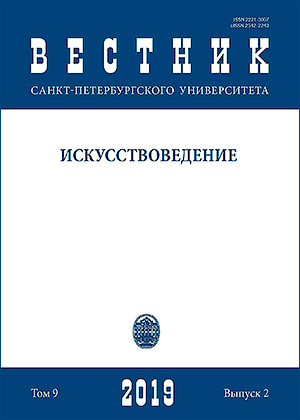On the Circumstantial Context of J. S. Bach’s Canon super Fa Mi BWV 1078
DOI:
https://doi.org/10.21638/spbu15.2019.202Аннотация
As tentatively accepted by most twentieth-century J. S. Bach scholars, the dedicatee of Canon BWV 1078 might be Benjamin Gottlieb Faber, a physician with a musical background and a friend of Bach’s student, copyist, and son-in-law, Johann Christoph Altnickol. The transparent encryption of Faber’s name in the text of the canon is reflected in the sole corresponding reference in Bach’s biography: B. G. Faber was the representative of the absent godfather (J. S. Bach) at the baptism of Johann Sebastian Jr., the son of Bach’s daughter Juliane Friederica and her husband Johann Altnickol. This article substantiates the probability that B. G. Faber was indeed the dedicatee of Canon BWV 1078. I hypothesize that Bach’s deteriorating health in the early autumn of 1748, reflected in the sudden cancellation of his trip to Berlin to be godfather at the baptism of Carl Philipp Emanuel’s son Johann Sebastian Jr., along with sudden changes in Bach’s handwriting, indicate that he had most probably suffered a minor stroke that prevented him from traveling. The juxtaposition of the date of the canon’s composition, with the date of birth of Altnickol’s child, indicates that the announcement of Juliane’s pregnancy and decision to ask B. G. Faber to represent the absent godfather could have taken place close to March 1, 1749, when J. S. Bach dedicated this canon to Faber and, by doing so, expressed his gratitude to his friend.
Ключевые слова:
Johann Sebastian Bach, Canon BWV 1078, dedicatee, Benjamin Gottlieb Faber, J. S. Bach’s handwriting, J. S. Bach’s illness, acrostic, paragram
Скачивания
Библиографические ссылки
Загрузки
Опубликован
Как цитировать
Выпуск
Раздел
Лицензия
Статьи журнала «Вестник Санкт-Петербургского университета. Искусствоведение» находятся в открытом доступе и распространяются в соответствии с условиями Лицензионного Договора с Санкт-Петербургским государственным университетом, который бесплатно предоставляет авторам неограниченное распространение и самостоятельное архивирование.






